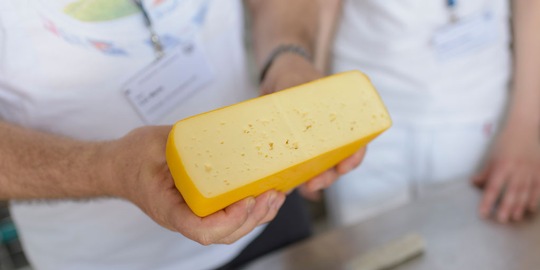Germans want more sustainability in their shopping basket

A good fifth of Germans would buy food that was produced without chemical pesticides but with the targeted use of mineral fertilizers. And: You would be prepared to dig deeper into your pockets for this. Scientists at the University of Hohenheim in Stuttgart investigated this using milk and milk products as an example. The marketability of the food resulting from the so-called NOcsPS cultivation system is a prerequisite for its establishment.
It could become the agricultural system of the future: a cultivation system that does not allow chemical-synthetic plant protection, but at the same time enables the targeted use of mineral fertilizers. It combines the advantages of conventional and organic farming and reduces their respective disadvantages. Developing such a cultivation system is the goal of the research project “Agriculture 4.0 Without Chemical-Synthetic Plant Protection” (NOcsPS, pronunciation: nʌps) at the University of Hohenheim.
But in order for such a system between conventional and ecological to be established, a prerequisite must be met: “NOcsPS products can only establish themselves on the market in the long term if there is consumer acceptance and a willingness to pay more,” explains Marie-Catherine Wendt, research assistant at the Department of Consumer Behavior in Bioeconomy. In a representative online survey of 1.010 people, she determined consumers' willingness to pay for NOcsPS products and analyzed the size and characteristics of a potential target group in Germany.
Women and older people in particular would buy NOcsPS products...
The study results show: Around 23 percent of the German population can be assigned to “future consumers”. This consumer segment is characterized by a fundamental rejection of the use of pesticides in food production.
“We also find a higher proportion of female and older consumers here,” explains Wendt. In addition, this group shows a strong awareness of pesticide residues in food and possible effects on the environment and human health.
...and spend more money on it
According to the study, consumers would also be willing to pay more for NOcsPS food, Wendt notes: “On average, they would spend 31 percent more on NOcsPS milk, 23 percent more on NOcsPS cheese and 24 percent more on NOcsPS butter than for conventional comparison products.”
“Decision-makers in the agricultural and food industry can use our findings,” adds Jun.-Prof. Dr. Ramona Weinrich, head of the consumer behavior department in the bioeconomy. “They should develop understandable labeling of products and ensure that these products are credible in society.”
BACKGROUND: Joint project “Agriculture 4.0 Without Chemical-Synthetic Plant Protection” (NOcsPS)
The project “Hypothetical willingness to pay analysis and target group analysis for milk and dairy products produced without chemical-synthetic crop protection” with the study “Consumer Segmentation for Pesticide-free Food Products” started in 2022. It is a supplementary project to the NOcsPS joint project.
NOcsPS was launched in June 2019 and will run until November 2024. A total of 28 collaborative projects are working on the various aspects of the development of the NOcsPS cultivation system. The range of topics is broad: from production within the framework of system, exact and on-farm tests at plot, field, farm and landscape level, to ecological, economic and social assessment, to acceptance and willingness to pay along the value chain.
The University of Hohenheim coordinates the project. Other project partners are the Julius Kühn Institute (JKI) and the Georg August University of Göttingen. The project is being funded by the Federal Ministry of Education and Research (BMBF) in the “Agricultural Systems of the Future” funding program with almost 5,3 million euros, of which around 4,5 million euros are for the University of Hohenheim. The network coordination is in the hands of Prof. Dr. Enno Bahrs from the Department of Agricultural Management at the University of Hohenheim.
